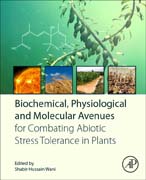
Biochemical, Physiological and Molecular Avenues for Combating Abiotic Stress Tolerance in Plants
Wani, Shabir Hussain
Abiotic stress tolerance is a constant challenge for researchers and professionals working on improving crop production. Combining recent advances with foundational content, Biochemical, Physiological and Molecular Avenues for Combating Abiotic Stress Tolerance in Plants offers in-depth coverage on a variety of abiotic stress tolerance mechanisms to better understand and improve plant response and growth under stress conditions. The mechanisms explored in this book include stress perception, signal transduction and synthesis of stress-related proteins and other molecules. This book also provides a critical understanding of the networks of genes responsible for abiotic stress tolerance and their utilization in the development of stress tolerance in plants. Practical breeding techniques and modern genetic analyses are also dealt with. Biochemical, Physiological and Molecular Avenues for Combating Abiotic Stress Tolerance in Plants is a must-have reference for researchers and professionals in agronomy, plants science and horticulture. Unlocks the physiological, biochemical and molecular basis of abiotic stress response and tolerance in crop plantsPresents comprehensive information on abiotic stress tolerance from gene to whole plant levelIncludes content on antioxidant metabolism, marker-assisted selection, microarrays, Next-generation sequencing and genome editing techniques INDICE: 1. Abiotic stress: a serious threat to crop production and opportunities for improvement in stress tolerance2. Abiotic stress responses and adaptive mechanisms in major crops: The chronicle hitherto3. Physiology of Reproductive-Stage Abiotic Stress Tolerance in Crop Plants 4. Single versus multi gene transfer approaches for crop abiotic stress tolerance5. Targeting aquaporin proteins for conferring salinity tolerance in crops6. Compatible solute engineering of crop plants for improved tolerance toward abiotic stresses7. Phytohormones: potent targets for engineering abiotic tolerance in plants8. Engineering plant heat shock proteins for improved salinity tolerance 9. Transcription factors based genetic engineering for abiotic tolerance in crops10. Targeting the redox regulatory mechanisms for abiotic stress tolerance in crops 11. Epigenetic regulations and modifications for enhanced crop abiotic stress tolerance12. RNAi Technology: the game changer in producing abiotic stress tolerant crops13. Genomics interventions for enhancement of crop abiotic stress tolerance 14. Molecular chaperones - structure, function and their role in crop abiotic stress tolerance15. Exploiting beneficial soil microorganisms to improve crop abiotic tolerance 16. Manipulating secondary metabolites for engineering abiotic stress tolerance in crops17. Glyoxalases: a potent targets for engineering drought and salinity stress tolerance in crops 18. Controlling programmed cell death pathways for enhancing the abiotic tolerance in crops19. DNA helicases mediated abiotic stress tolerance in plants20. CRISPR/CAS approach for conferring abiotic stress tolerance in crops
- ISBN: 978-0-12-813066-7
- Editorial: Academic Press
- Encuadernacion: Rústica
- Páginas: 400
- Fecha Publicación: 01/05/2018
- Nº Volúmenes: 1
- Idioma: Inglés
